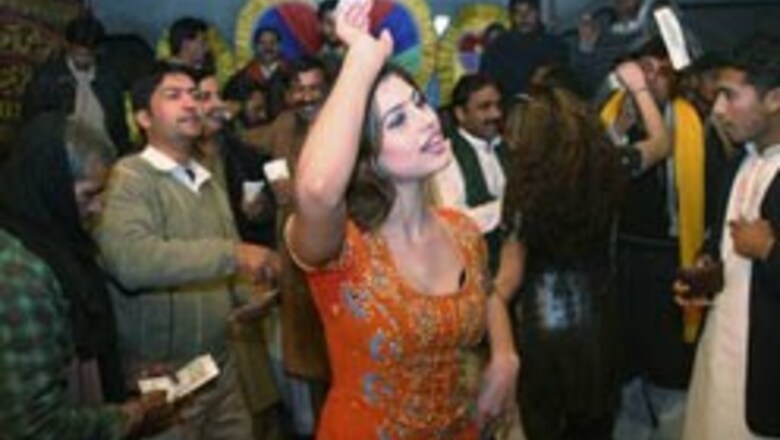
views
Multan (Pakistan): A crowd of men whistle and cheer as a pretty young woman in a revealing red top and tight jeans dances on stage in a run-down Pakistani neighbourhood.
But this is not a nightclub, or cabaret floorshow. The men are watching a play, spiced up with a sexy dance number to attract a larger audience.
As risque programming gains popularity on cable television and pirated DVDs, traditional entertainment such as the theatre has had to find novel ways of holding an audience in the conservative Muslim country, industry insiders say.
"We have to compete with these TV channels and pirated films or we will also go bust," said Zawar Baloch, a producer who had his theatre closed down in the central city of Multan for staging a play with dancing acts which government censors deemed obscene.
But not everybody is happy about Pakistani theatre's newfound love of the lowbrow.
These days it is often dancing girls that draw mostly male audiences to plays, not great writing or acting, said Sohail Ahmed, one of Pakistan's best-known playwrights and actor.
"Theatre has been an essential form of art in the subcontinent and despite restrictions, has highlighted relevant social and political issues," Ahmed said.
"Unfortunately, culture and art is also being exploited in Pakistan by some to make a quick buck,” he added.
At the Khayyam theatre in the central city of Multan, young women such as the one in the revealing red top dance to popular Indian and Pakistani songs six times during the play Kuriyan Chand Weay (Girls of the Moon).
The play is a comedy about a dowry-hungry father who does not realise the rich suitors he hopes to marry his daughters off to are all con artists.
"These dramas don't represent our eastern values or our literature," said one of the actors, Aamir Chugtai, a 20-year veteran of the stage, lamenting the decline of Pakistani theatre.
Greedy investors have become producers and writers, and young women with no acting ability seek fame and fortune, he said.
"No new scripts are written. Only titles and names change," he explained.
CULTURE AND RELIGION
Critics say the new breed of racy theatre producers are taking advantage of more liberal trends in the arts and media under the rule of President Pervez Musharraf.
His policies are a sharp shift from his predecessor, General Zia ul Haq. During his 1977-1988 rule, religion was used to suppress cultural activities and women were only allowed on state-owned television channels if they wore Islamic veils.
PAGE_BREAK
But rather than praising the relaxations, some actresses complain the new plays' popularity has forced them into a rigid new role: that of titillating dancers.
Sitting backstage, actress Nusrat Aftab rued the fact that after 12 years on stage, she had no choice but to work in such productions, or face unemployment and poverty.
"I feel sad and bad but everyone is doing it. People want to watch it," said Billo Chaudhary, another of the young dancers.
In Punjab province alone an estimated 100 theatres put on racy plays, with ticket prices ranging from an affordable Rs 300 ($5) up to a relatively hefty 1,000 ($17).
Plays have to be approved by government censors, which allow a maximum of three dances in a play, but that rule appears to be regularly flouted.
"Our job is to ensure there is no performance that excites the audience sexually," said Syed Akhtar Zaidi, one of the city officials overseeing entertainment.
Censors are trained to look out for women dancers exposing themselves or dancing suggestively.
Last month, three theatres were shut down in Multan after their dancing shows were deemed obscene. Police have even detained dancers.
"We have had to take action after our own people, disguised as a spectator, caught girls exposing themselves on stage and at times the (play) dialogue has also had a double-meaning and been vulgar," Zaidi said.
Despite the crackdowns, lowbrow theatre seems set to stay in Pakistan, as it's enthusiastic new male audience is happy to pay for the dancing acts and the veneer of respectability a trip to the theatre offers.
"Sex sells everywhere in the world but we Pakistanis are a closeted lot and hide our feelings. Now for a few hundred rupees, you can tell your family or friends you saw a play. It's respectable," said Nadeem Mandviwalla, a film distributor.




















Comments
0 comment